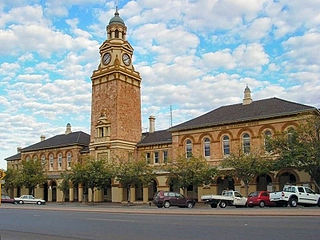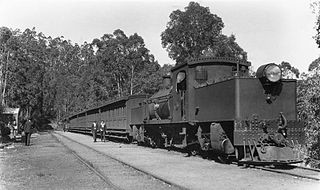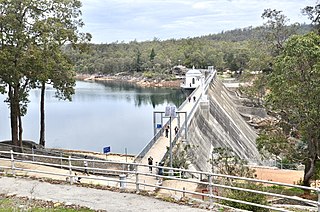
Kalgoorlie is a city in the Goldfields–Esperance region of Western Australia, located 595 km (370 mi) east-northeast of Perth at the end of the Great Eastern Highway. It is sometimes referred to as Kalgoorlie–Boulder, as the surrounding urban area includes the historic townsite of Boulder and the local government area is the City of Kalgoorlie–Boulder.

John Forrest National Park is a national park in the Darling Scarp, 24 km (15 mi) east of Perth, Western Australia. Proclaimed as a national park in November 1900, it was the first national park in Western Australia and the second in Australia after Royal National Park.

Southern Cross is a town in Western Australia, 371 kilometres east of state capital Perth on the Great Eastern Highway. It was founded by gold prospectors in 1888, and gazetted in 1890. It is the major town and administrative centre of the Shire of Yilgarn. At the 2016 census, Southern Cross had a population of 680.

The Eastern Railway is the main railway route between Fremantle and Northam in Western Australia. It opened in stages between 1881 and 1893. The line continues east to Kalgoorlie as the Eastern Goldfields Railway.

The Mundaring Weir Branch Railway was constructed from Mundaring, Western Australia to the site of the Mundaring Weir, and opened on 1 June 1898.

Mundaring Weir is a dam located 39 kilometres (24 mi) from Perth, Western Australia in the Darling Scarp. The dam and reservoir form the boundary between the suburbs of Reservoir and Sawyers Valley. The dam impounds the Helena River.

Sawyers Valley is sited on the Great Eastern Highway about 40 kilometres from Perth, Western Australia in the Shire of Mundaring. The community began as a sawmill and railway siding to process timber from the forest surrounding the Helena River to the south. Local employment included forest and Goldfields Water Supply Scheme maintenance, small orchards, and the Midland Railway Workshops. The suburb's name comes from the occupation of many of the first European settlers to the area in the 1860s, who were sawyers working at the local saw-pits. The Sawyers Valley Tavern, which sits on the Highway opposite the Railway Reserve Heritage Trail, was first established in 1882 and the Sawyers Valley railway station was built in 1884.
Parkerville is a suburb in the Shire of Mundaring in Perth Western Australia.

The Goldfields Water Supply Scheme is a pipeline and dam project that delivers potable water from Mundaring Weir in Perth to communities in Western Australia's Eastern Goldfields, particularly Coolgardie and Kalgoorlie. The project was commissioned in 1896 and completed in 1903.

The Mundaring and Hills Historical Society (MHHS) is a local history society for the Shire of Mundaring, based in Mundaring, Western Australia.

The network of railway lines in Western Australia associated with the timber and firewood industries is as old as the mainline railway system of the former Western Australian Government Railways system.
Broad Arrow is a ghost town in Western Australia, located 38 km north of Kalgoorlie and 633 km east of Perth. It is on the Kalgoorlie to Leonora Road.
The Kalgoorlie Brewing and Ice Company opened in 1896 in Kalgoorlie, Western Australia and traded successfully until 1943, when it was taken over by the Swan Brewery, and its name was simplified to Kalgoorlie Brewing Company. The Brewery, known locally as the 'Big K', located at Porter Street, Kalgoorlie, was the last survivor of nineteen breweries that once traded in the Eastern Goldfields.

Mundaring Cemetery is located at the intersection of Yarri Grove and Railway Terrace, Mundaring, Western Australia.

The Chidlow Tavern was opened in 1884 in Chidlow a hills suburb of Perth, Western Australia. It was originally called The Oxford Inn before assuming its current name in 1973.

The Mount Helena Tavern was opened in 1902 in Mount Helena, a hills suburb of Perth, Western Australia. It was originally called the Lion Mill Hotel, then the Mount Helena Hotel, before acquiring its current name. Locally it is referred to as The Mounties.

The Mundaring Hotel was opened in 1899 in Mundaring, a hills suburb of Perth, Western Australia.

Mundaring Weir Hotel, is located in Mundaring, Western Australia.

The Sawyers Valley Tavern was established in 1882 in Sawyers Valley, a hills suburb of Perth, Western Australia. It was originally called the Sawyers Valley Hotel before acquiring its current name.

















